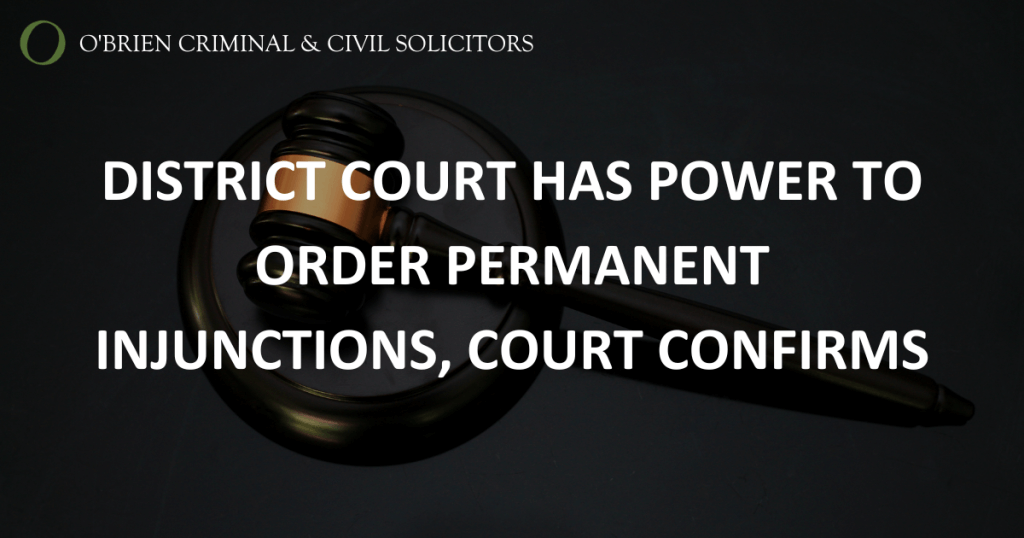The District Court of NSW has confirmed it holds the power to grant permanent injunctions.
In a defamation case handed down last week by Her Honour Judge Gibson, the Court awarded the Plaintiff a permanent injunction. This confirms the court’s powers which were somewhat uncertain to date.
Food blogger eats words after Court orders him to pay $300,000 in damages for defamation
Issac Martin, who is better known by is handle @issac_eatsalot, is $300,000 richer after the Court held that a series of posts from a rival blogger stating he was a “paedophile” were defamatory.
The posts from April this year by Fouad Najem were held to have been a part of a campaign to “attack and discredit the reputation of the plaintiff”. The defendant did not appear at the hearing nor did he send any legal representatives or produce any evidence. Further, Her Honour noted that the defendant was likely to continueto post about the Plaintiff.
“I think it potentially likely to be the case that, after this judgment is circulated, there will be further publications by the defendant.”
Plaintiff seeks permanent injunctions for defamation
The Plaintiff sought a permanent injunction in the Statement of Claim as follows:
“The Defendant by himself or by his servants or agents, be permanently restrained from publishing, or causing to be published, any matter that conveys any one or more of the following imputations, or imputations not differing in substance, of and concerning the Plaintiff:
a. he is a paedophile;
b. he is a racist; and
c. he is the most hated person in the social media marketing industry.”
Her Honour carefully analysed whether the District Court of NSW can make orders for permanent injunctions noting that the District Court is a creature of statute and has no inherent jurisdiction.
Section 46 of the District Court Act and “ancillary” relief
Section 46 of the District Court Act 1973 (NSW) (the Act) has the title “Ancillary equitable relief: injunctions”. It provides that the Court has the power to grant an injunction (whether interlocutory or otherwise) which the Supreme Court could grant if the proceedings took place in the Supreme Court.
Her Honour questioned whether the power extended to final judgements.
For example, take United Telecasters Sydney Ltd v Hardy. In this matter, Samuels JA stressed the District Court’s lack of jurisdiction to deal with a threatened contempt of court where that contempt was not “in the face” of the court. However, Her Honour noted that section 46 of the Act didn’t apply to this case.
Equitable relief: No doubt as to freezing orders; but final orders?
There is no doubt that the District Court can make Mareva Injunctions, otherwise known as freezing orders.
However, there was significant discussion of the powers of the District Court by the High Court in Pelechowski v Registrar (1999) 198 CLR 435.
Pelechowski was convicted and sentenced for contempt by the NSW Court of Criminal Appeal after he was held to have violated an order purported to be a Mareva Order made by the District Court
The appeal was allowed and the conviction was squashed, on the basis the order made by the District Court was not of the nature to be defined as an injunction or an injunction in an action under s46 of the Act.
Kirby J, who held the appeal should be dismissed altogether held:
“Early statutory provisions permitting parties to an action in the District Court to rely on defences based on equitable grounds were limited and specific. They remain so. The court is called “inferior” because its jurisdiction is limited. Unless power is expressly conferred on the District Court, or necessarily implied from powers so conferred, a party seeking broader remedies must resort to a court of unlimited jurisdiction. In New South Wales, this is the Supreme Court of the State.”
Her Honour in the present case explained that “power to make such orders was contained in s 46, and Kirby J disagreed with the narrow approach taken by the appellant to the language of this provision, calling it “absurd” and “unpersuasive” (at [137] – [138]) because it ran contrary to “commercial realism” (at [140]).”
Her Honour concluded on the issue “the reasons explained by McHugh J and by Kirby J for stating that this court has powers of this kind under s 46 are persuasive. The issue of this court’s power to grant permanent injunctions cannot continue being uncertain.”
Court clears up confusing process, streamlines injunctions
Permanent injunctions have been granted in defamation proceedings in the District Court before, but only when the case was transferred from the Supreme Court.
When a case is transferred from the superior court, the powers of the Supreme Court travel with the claim.
Her Honour suggested this system created a splinter in the powers of the Court.
“[I]f this court does not have jurisdiction to make permanent injunctions, the result is a two-tiered distinction between cases transferred from the Supreme Court, where there is power to grant a permanent injunction where the limited nature of the claim makes it more suitable to run in the District Court, and cases commenced in this court, where the plaintiff is effectively punished for starting in the correct court by not being able to seek a permanent injunction. That is undesirable.”
“Accordingly, I am of the view that, for the reasons set out in the dissenting judgments of McHugh and Kirby JJ in Pelechowski, the District Court of New South Wales has jurisdiction to grant permanent injunctions. I accordingly make an order for a permanent injunction in the form sought by the plaintiff.”
If you need to seek injunctions or believe your reputation has been harmed over social media, contact our defamation lawyers today. The first consultation is free.
Sarah is a civil solicitor who primarily practices in defamation, intentional torts against police, privacy and harassment.
- Sarah Gorehttps://obriensolicitors.com.au/author/sarahg/
- Sarah Gorehttps://obriensolicitors.com.au/author/sarahg/
- Sarah Gorehttps://obriensolicitors.com.au/author/sarahg/
- Sarah Gorehttps://obriensolicitors.com.au/author/sarahg/





